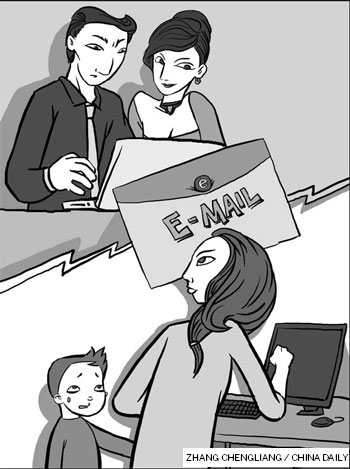Comment
Investment bank tabloid
By Qi Zhai (China Daily)
Updated: 2010-03-22 08:09
 |
Large Medium Small |

When I worked at an investment bank the first thing my boss taught me was the importance of discretion.
We were generating profits for the world, allocating capital to the most deserving and striving for utopian efficiency. Yet, at the same time, these endeavors were carried out under a cloak of secrecy, and at times there were underhand dealings, intrigue and sex.
My boss' advice was: "Avoid scandal. Don't send anything dubious by e-mail and if you receive something just leave it. Don't reply, don't delete, remain a bystander."
So, imagine my surprise when I received a forwarded e-mail in which a Chinese wife, a cheating husband and a mistress swapped fighting words (in English) via e-mail and cc'd all their friends.
The content of the e-mails gave netizens voyeuristic pleasure over the disintegrating lives of others. (I've withheld names to preserve any remaining dignity for the parties involved.)
The wife's initial e-mail reads: "As a fellow woman, I often wondered if the level of ecstasy this vacation brought you equates to the level of devastation this vacation brought to my children and me."
The husband's reply: "I am firmly standing by and behind (my mistress). I will certainly hope she will marry me one day soon!"
The mistress' self-defense: "You nonetheless sought to burn me on the cross as the scapegoat for your failed marriage."

More shocking - and tantalizing to netizens - was the professional profile of the love triangle and the invited spectators. A finance world recruiter friend in Hong Kong verified for me that these e-mails came from and went to real people holding important posts in big banks including Credit Suisse, Merrill Lynch and Standard Chartered.
My first thought was, "I can't believe this really happened!" Such bigwigs should surely know the basics of email discretion! How could they air their dirty laundry in front of the whole industry? I could understand the wife sending the first in a jealous rage, but what happened to the "don't reply" rule when it came to the husband's and the mistress' turns to maintain a dignified silence?
The trio conducted round one of e-mails with icy and sarcastic civility, signing off with "Best regards" and "With sincere regards." By round two, the wife really let it rip:
"I shall slit your throat before the eyes of your 'love', letting him witness the true blood color of a whore, which stinks of lust."
I was at a loss for what to make of it, so I spoke to some girlfriends to see what their thoughts were, as women and as finance professionals. One friend, a former Goldman Sachs employee, jumped in with a feminist view - "Why do women always blame each other? The man is the real culprit here."
She was right. The wife had sent her choicest words to the mistress and cc'd their industry peers with the intent of shaming her. Why didn't she write an open letter to her cheating husband instead? I suppose it's easier to hate the mistress without mixed emotions or fear of future blame from the children. But, as the saying goes, "It takes two to tango."
Another friend sent me a New York Times story about young couples fighting their intimate battles on Facebook. In the article, the writer interviewed a wife who called her husband "Jerky McJerk Jerk" on her page. A friend of another fighting (and engaged) couple bemoaned the fact that the public bickering was disrespectful to mutual friends. After all, she had spent plenty of time helping them work out their issues in private.
As I ponder love, marriage and intimacy in the cyber-age I wonder what psychological damage these bitter e-trails do to the children? Is there a risk of physical danger to the parties involved at the hands of netizens intent on supporting one of the parties?
But most of all I wonder: what happened to our ethics? Young students are the ones surfing English materials online and here they are treating one family's pain as fodder for jokes, even translating the original e-mails into laughable local dialect versions.







